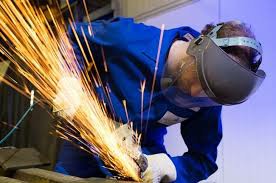


 349,500 Offered Certificates
349,500 Offered Certificates
 24/7 Online Training
24/7 Online Training
 Money Back Guarantee
Money Back Guarantee
 Fully Accredited Courses
Fully Accredited Courses

Created at: 22-02-2025 20:38
Abrasive wheels are crucial tools in various industries, including manufacturing, construction, and metalworking. These wheels are designed to grind, cut, or polish materials through friction and come in different sizes and compositions. However, while their functionality is invaluable, the use of abrasive wheels poses significant safety risks if not handled correctly. This article explores the definition of abrasive wheels, the common risks associated with their use, and why proper training is essential for safety.
Abrasive wheels are rotary tools commonly used in machinery for cutting, grinding, or polishing surfaces. Made from various materials, including aluminum oxide and silicon carbide, they vary in composition depending on their intended application. Abrasive wheels can be found in:
While abrasive wheels are essential to many industrial processes, they also come with inherent risks, including:
Given the significant risks associated with abrasive wheels, proper training is critical. An effective training program should cover:
To mitigate risks while working with abrasive wheels, it is essential to follow these safety guidelines:
In Ireland, workplace safety standards mandate training and certification for operators using abrasive wheels. Employers must adhere to the Safety, Health and Welfare at Work Act, ensuring all operators are adequately trained and assessed for competency before handling these machines. Compliance with these regulations not only protects employees but also shields companies from potential legal issues arising from workplace accidents.
To further prevent accidents when working with abrasive wheels, following best practices is crucial:
To ensure compliance with safety standards and reduce workplace accidents in Dublin, Cork, Galway, Limerick, Waterford, and beyond, consider enrolling in a certified abrasive wheels training course. Our Abrasive Wheels course covers all necessary aspects of safe operation and compliance with Irish workplace safety standards.
For further inquiries or to sign up for a course, please contact us at [email protected].